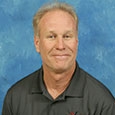The aim of Munford (Tennessee) High School director of bands Barry Trobaugh is to provide his students with unique learning and performance opportunities while they are his students. This includes performing in the Macy’s Thanksgiving Day Parade in 2015 and an upcoming trip to Pasadena, California to march in the 2019 Tournament of Roses Parade. “My goal is to provide these students with life long memories through their musical achievement on our campus and then the performance recognition off campus.
“My long-time assistant, Gary Fite, and I are energetic people and have worked well together for the last 24 years. I am 61 years old and strive to work as hard or harder than any of my students. I am the first one out there and the last one to leave, not because I have to be but because I want to be. Our choir director, Doug Young, a formally trained instrumental teacher as well, gives up his planning period to help out with our 200-plus students. Gary is primarily in charge of the middle school, but he also gives up his planning period to come help our high school students during their classtime. I go to the middle school each afternoon immediately after high school band to teach beginners with him. From the time we hit the campuses, we are busy and engaged in something to help our students learn. The community embraces how hard we work in hopes of having a good program and how dedicated students are to the program. There are numerous students in grades 6-12 who are children of former students. In many of those cases, it is not a question of whether they join band, but only a matter of what instrument they are going to play.”

How did the Munford Band build its culture of success?
When Gary and I took over this program in 1994, we had 180 students. They didn’t play as well as we would have liked, but they seemed interested in coming to the band room and learning a little bit about music. That’s what we built our program on – fellowship and family. I was the third band director that the seniors had seen during their high school career.
They were great kids and instantly fed off of our desire to be active as they are. In the first couple of weeks, I saw that they had never really been pushed to work hard or take responsibility for the skills needed to play an instrument well. Within a couple of months the feel of band at Munford was different. It started when we went to the local marching festival and earned a superior rating, which was unheard of for the program in recent history. That success lit a musical fire under these students, and things started growing like crazy. Students were practicing. They may have never been shown how to practice and better themselves before, but once they found the value of practice outside the bandroom, there were never instruments left at school on a weekend. We now have 24 consecutive superior ratings at the state marching contest.
Toward the end of that first season we won a contest – the first such win in a decade or more. I remember the tears on every child’s face after they won this show. They knew how hard they had worked, and, perhaps for the first time, they saw that hard work leads to amazing things.
A couple months later, we competed at the Bandmasters Championship, which is held every year in the Liberty Bowl, a beautiful stadium in Memphis. It is the state’s longest running and most widely attended marching event, drawing groups from several states. In that first year we sneaked in a fifth place placement, which I thought was just incredible. I actually questioned whether we were a little higher than we should have been; that’s how proud I was of fifth place.
Next year, the competition was even more skilled. At the time, there were a couple programs that would seem to win a competition as long as their buses made it to the parking lot. That’s how good they were. At that time it was Bartlett High School in suburban Memphis and Grenada (Mississippi) High School, and once again In 1995, both those bands attended the Bandmasters Championship. My goal, as I shared with the students, was to be one of the ten bands that made the finals. We waited through the small class announcements, and as they began announcing places in our class, the largest, we were not named the third place band nor the second. At this point, they hadn’t called out one of the expected winners, so we assumed, as usual, that once again they had won. I looked at my assistant and said, “Well, we didn’t make finals. We should still sit up in the stands and let our students watch the finals. We’ll get after it next year.” After I finished saying that, it was announced that Munford High School won that class – and ended up winning the whole show. It was a defining moment in the program, and I remember the gratification that what we were doing here was maybe turning into something special. The students were shell-shocked. We have now won that particular event 19 times, and the celebrations are amazing. When we have been successful enough to win, students remain off the bus and dance in celebration. Sometimes I would love to go home, but if playing music and dancing excites them and keeps them working hard and staying interested in music, then I will gladly sacrifice the extra sleep.
You have developed a new three Rs to replace reading, writing, and arithmetic. What are they, and what lead you to develop them?
Munford is a far-flung suburb of Memphis. Considering our population, there is little opportunity for employment here, and a number of people drive north into our county seat or face a long commute into Memphis to work for corporations like Unilever, International Paper, or FedEx, as much of our community is blue collar. Some of my students are well below the poverty line, and you do not have to travel far at all to witness some of the negatives that an urban community can display. To help these students make a difference as they became adults, I developed a new three Rs to counteract the negative or discouraging influences Munford students might face.
Responsibility. I want my students to be responsible to themselves and everyone else.
Respect. I want students first to respect themselves, and I also preach a little bit about blind faith. I think students need to have respect for people who have proven they are worthy of such an honor, such as our school administration, local community leaders, or the band staff. We should have proven to even the newest of students that we have had success in the past, and if they will do as we ask them to we can be successful again.
Resiliency. This is the one I work on the most with my students, because life is hard. I want students to understand that life is not all about successes. You have to analyze what didn’t take you to level of success you were aiming at and redevelop your plan to do better the next time. I want students to take defeat not as a matter of failure, but as an opportunity to refine the approach so they do better the next time. It is easy to say that about band, but my goal is for students to be resilient about life and not just throw the world away because they didn’t get the job they wanted, the date they wanted, or the band contest win they wanted. I want them to be productive people in society because that is what our area is going to need. It needs a bigger influx of people who know how to get the job done and make our area a better place.
Teachers have such a great effect on their students, and I want to use my time with my students to help them be better adults, to make better decisions, and to be more successful. I realized 12-15 years ago that my students actually do listen to me, and if I emphasize something, they seem to believe it. What I want to emphasize is that they can make a difference. This is part of why we have embraced students who may not really fit in socially anywhere else on campus. If a child wants to work harder in band than at anything else they have ever worked for in life, I don’t care what their background is, I don’t care what their socioeconomic status is, I don’t care what their challenges in life are, I will accept them into my program, and they will work as hard as they can.
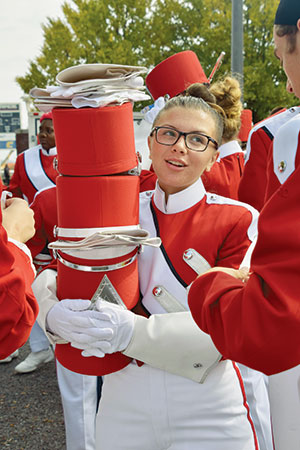
How does your role as part-time assistant principal help you work with your band students?
My graduate degree is in administration and supervision. I tried to get the university I attended to allow a music administrator degree, but they deemed it too close to their regular degree. I help each morning with attendance and assist with discipline problems. It fills my schedule but has worked out well for me because it allows me to see my students’ grades and learn what they are doing on the rest of campus. I am able to get to know my students’ habits more vividly and then guide them to success throughout our campus at Munford High School. This is no small feat; there are 1,300 students in the school and well over 200 in band.
How do you keep beginners motivated once they have joined the band?
We remind beginners early and often that they are joining a successful program at the high school. I like to use the phrase “your high school band,” as in “Your high school band is giving a concert. If you’d like to come we’d love to have you there.” We always promote that lineage. Students might be 11-year-old beginners in the program, but our goal is to develop them step by step, one day at a time, so that each of them is the next superstar in the Munford High School Band. Each beginner class is usually 100 students, and we get 50-60 eighth graders who come to the high school program each year.
What are the skills that you most want to instill in the students before they get to high school?
I teach beginning woodwinds and horn. Although the horn is my primary instrument, I have an easier time teaching woodwinds. The horn came easily to me, so maybe I never developed a pedagogy of practice, rhetoric, and sequencing. With my woodwinds I had to develop these skills to play and teach them. Once they make it to the high school, retention is nearly 100%. The only students we lose are the ones who are so far behind academically that the administration has to pull them from the program to ensure academic success.
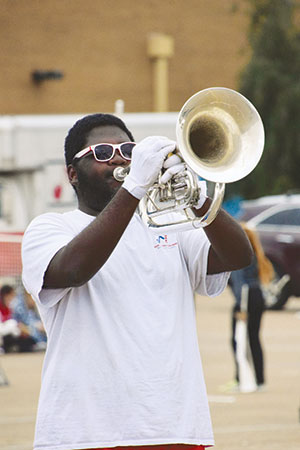
What have you learned about teaching beginning woodwinds?
Many years ago, my high school clarinetists could not get the pitch up to A440. For a couple years, I even tuned my group to A438, because that was where my clarinets seemed to be. I thought I was a terrible clarinet teacher. While on the telephone with one of my clarinet teacher friends, he asked my how my groups were doing. I mentioned the pitch problems, and after quizzing me on technique, he asked what instruments and mouthpieces I had them playing. When I told him, he said, “Well, those don’t go together.” He gave me four other mouthpieces to try. We made the switch, the pitch moved up to where it should be, and my students instantly felt better about their playing.
With teaching clarinet, now younger educators quiz me about instrument, mouthpiece, and reed choices. In addition, they ask what my clarinetists needed to be practicing. Do they work on long tones like brass players do? What method books are most beneficial for a developing player?
Even with beginning clarinetists, we do not play any of the throat tones without the right hand down. When students point out that the method book doesn’t use this fingering, I say, “This is what the Munford High School Band does, and it is why the sound is so warm.” The truth is that I don’t have time to teach beginning clarinetists to play open G and then start teaching them to put the right hand down when I get them again in ninth grade.
In flute, oboe, and saxophone class, we start vibrato early. It becomes part of the fabric of their tone development rather than something to be added later. When I demonstrate these instruments, I play with a warm sound and a vibrato, because I want them to hear what a good sound sounds like. I am not a professional, but I’m as close as they are going to get. My kids generally don’t go to see the Memphis Symphony or any other professional group. I provide tickets to the Memphis Wind Symphony concerts, but they still have to travel to Memphis, and that impedes many of them. When Gary and I pick up an instrument, that is what our students think it is supposed to sound like, so we take that responsibility seriously.
I teach chromatic fingerings at the earliest opportunity. I show my flutists what the right-hand trill keys do early in the teaching sequence. I demonstrate that there are other fingerings for many notes, and while we do not use them on a daily basis, the time will likely come when an alternate fingering will make something easier. We talk quite a bit about working smarter, not harder. Children can only work so hard before getting overloaded, so they have to work smarter. This is our challenge, too. There is only so much tread on your tire, so how are you going to run it off? Where are you going to get to with that tire?
What sort of community outreach does the program do?
We have an annual town celebration called Celebrate Munford, which is an all-day Saturday celebration of South Tipton County that usually occurs on the third weekend of September. There are arts and crafts and numerous concerts, and the culmination is the marching band standing and playing the show music and some other pep band tunes. We have never come to this event and played for fewer than 4,000 people. It is hot and people have places to go, but even though we are not at our strongest as a band at this time of year, they will stand and watch these excited students play.
We have a jazz band that travels to each of the elementary schools in our area. It is recruiting; I call it the “chocolate milk tour,” and it is a highlight of the three elementary schools’ day. We play a two-and-a-half-hour concert with kids going in and out of the cafeteria during their lunches. At least once a month I have a chamber group playing at a restaurant. We try to keep some facet of our program out as much as possible so the community sees what we do.
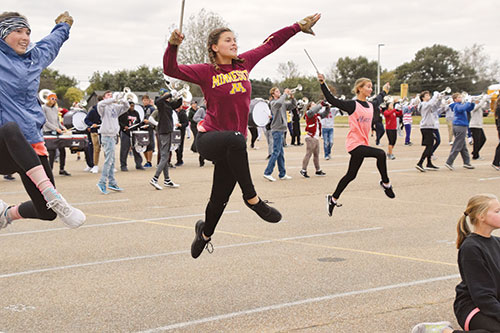
How do you teach students to march?
The key to solid marching is fundamentals. Start teaching them and never stop. On the first day of band camp, we treat every student the same, whether freshman or senior. We introduce them to their left and right feet. We spend an inordinate amount of time for someone who is not well-versed in what we do, just developing the out-down, which is moving the left foot out, somewhat elevated, and placing it down – heel first, middle of the foot. You cannot successfully execute the out-down of the step without core control. When you move the left foot forward to take the first step of marching, the core (especially the upper body) cannot compensate for movement by going forwards or backwards. We address every morsel of what the lower extremities are doing. We do not talk much about the hip, we talk a little more about the knee, and a touch more about the ankle, but the focus is on the foot. We break everything down incredibly small, incredibly slowly, and very methodically. The results of this constant attention to detail on the visual side and is very evident late in the season by our abilities to move eloquently and consistently. Our goal is that you cannot identify a freshman or a senior in our band. We work hard to homogenize them all to look like Munford band performers.
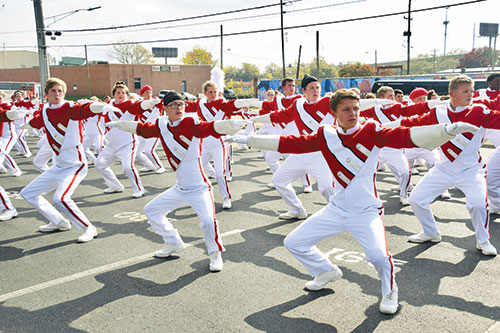
What are the most difficult marching techniques to teach?
The slow step is always the most dangerous because if any of those fundamentals break down those are going to cost you the most points. Eighty beats a minute is dangerous. Going forward at that tempo is a challenge but one that most performers can conquer. Eighty beats per minutes going backward is a little bit strange. I use Gilroy publishing for my marching music and encourage our composer, Steve Martin, to avoid using that tempo for us. At extremely fast tempos – above 160 – the same problem becomes evident, but here it is more likely to show in the upper body compensating for poor core control, which will be evident in direction changes that are not as sharp or consistent as they should be. Students start to lean forward when they march forward from a static position. This is using momentum to offset starting, stopping, and changing directions, and is a sign that their core control is just not as strong as it could be.
During marching season, what do you do every day?
None of our daily activities is more important than what we call Body Block, which we run whether we are at home in rehearsal or onsite for a contest. We start at a wide spacing, with students at least four steps from their nearest neighbor. Being aligned vertically and horizontally is important, as I want spacial awareness to be ever present and a strong part of what our students do. We do this to music, and usually I let my colorguard choose the song. They do a great job of choosing pop music, usually with an inspirational lyric or hidden inspirational meaning. Body Block starts with simple body moves similar to ballet or stretching. The aim is to move slowly and consider every cell. I ask students where their fingernails or the tip of their shoe went. I talk to them in those esoteric terms so I have them thinking outside of just moving the arm or leg. I am not concerned with where the leg moves, I am concerned with the end of the leg.
Over the three minutes it lasts, Body Block evolves into some difficult strength moves. We do pliés for four counts down and four counts back up. It takes a real athlete to do this gracefully. We also do body extensions. A good exercise is to move the arms slowly out to full horizontal and then back to the center core. We work on keeping the core muscles under control at all times. The core is what is most important; the arms and legs are the visualization of what we are trying to express. Other Body Block activities include moves we use in that year’s show and exercises that are fundamental to moving your body better. Body Block promotes the step-by-step progress of moving the body gracefully in time and with meaning. Marching is nothing more a group of performers doing glorified walking. The goal is to do so gracefully but with strength.
What advice would you offer to a new director?
I am not a social butterfly, but I have never met a stranger. You have to be a sponge more than a faucet. We teachers tend to be faucets. We talk all the time but listen little. I was told that about myself many years ago, and I try my best to make more of an effort to be a sponge. Listen to people’s successes and failures. It seems like I learn the most from listening to someone with a successful program describe something they tried that did not work. All band directors with less than ten years of experience should go outside of their district or region to see what is happening over the horizon from their local area and school. Attend the state convention, the Midwest Clinic, and Texas Bandmasters. Meet people. As you get more comfortable with teaching, you will be able to identify the people you can learn from the most. I have a network of hundreds of people I can call when I discover something new I don’t know, which still happens, even as long as I’ve been teaching. At the end of the day, I am but the summation and the product of some really smart people who I was fortunate enough to listen to.
.jpg)
* * *
Barry Trobaugh is the Director of Bands at Munford (Tennessee) High School. His career has spanned 37 years, and he is now in his 24th year at Munford. His marching, concert, and jazz ensembles are recognized nationally for their quality and consistency, including three State Championships, three Southern States Championships, and the USBands National Championship title in 2011.
Trobaugh is currently the President of Tennessee Bandmasters Association and is on the Audition Committee for ensemble selection to the Tennessee All State Convention, developing programs to enhance the efforts of local music educators. He also serves as the Musical Director and Conductor of the Memphis Wind Symphony. Trobaugh has twice been Teacher of the Year at Munford High School and was selected as a finalist for Tennessee Teacher of the Year in 2016.
